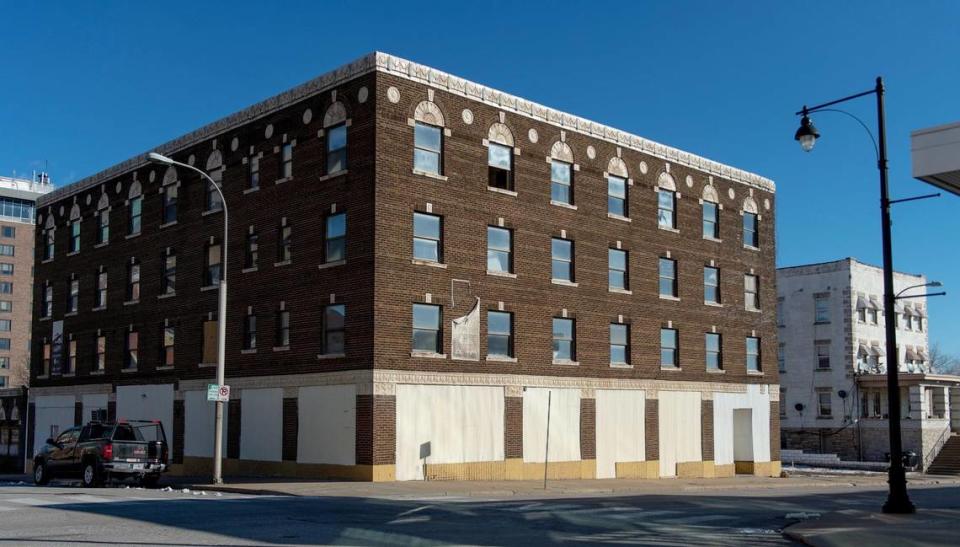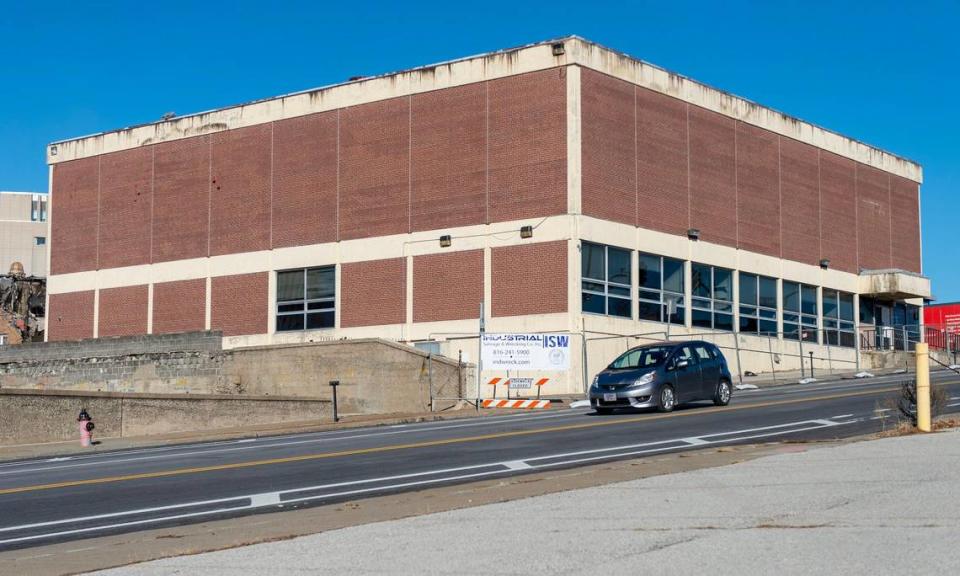Demolition starts in this Kansas City neighborhood as Royals push for downtown stadium
Kansas City has issued demolition permits for several buildings in the East Village, one of the top sites under consideration for a new downtown baseball stadium.
Crews have already begun tearing down the former Wiltshire Apartments building, a four-story brick structure at 10th and Holmes streets. Earlier this month, the city also issued pre-demolition permits for several other buildings in the East Village: the Della Lamb building at 1000 Charlotte St., the former Blackstone Hotel at 817 Cherry St. and a parking garage at 815 Cherry St.
The moves are the most visible sign in years of impending change for the long overlooked area of downtown — and underscore the belief of many that the neighborhood is the Kansas City Royals’ top choice for a new stadium.
“If I really had to make a bet and say to everybody today where that new stadium is being proposed, I am going with the East Village,” said Chris Stritzel, a developer who noticed the demolition of the Wiltshire building while walking around the area this week.
“When I saw this whole building being demolished, I was like that has to be one of the reasons why. I understand that the building wasn’t in the best shape…But at the same time, it seemed well enough where it wasn’t at any risk of collapse, at least in my opinion.”

Stritzel’s family has owned property in St. Louis, but he’s currently on the hunt for an inaugural Kansas City project. He said he’s considered the East Village area for a new residential development, but hasn’t yet made any decisions.
“And the debate that would come up is well, what’s the future of this area looking like because it’s quiet — nothing’s going on. You’re away from the hub of activity. So we’ve waited a while to really pull the trigger on something.”
But he’s more convinced than ever that the team has already selected this sleepy corner of downtown. Aside from the active demolition, he’s examined the renderings the Royals have released showing how a new stadium would look in the downtown area. “Everything fits perfectly,” he said.
“I just get the sense that they’re very orchestrated, where they already know where they’re going, they’re just giving a feel that this is an open comments and community engagement” process, Stritzel said.
The Royals have been flirting with a move away from their home at the Truman Sports Complex since John Sherman purchased the club. In November, the Royals’ CEO officially announced the team’s plans to move away from Kauffman Stadium.
Since then, team leaders have planned three public meetings to share their vision for a new stadium and surrounding ballpark village. Sherman in November said the development would cost some $2 billion — about $1 billion for the stadium and another $1 billion for the ballpark village.

The Royals currently lease Kauffman Stadium from Jackson County under an agreement that runs through the end of the 2030 season. Team officials have not yet said how much financial support they will ask of taxpayers for a new ballpark.
But Sherman said the team would not ask any more from Jackson County taxpayers, who currently are paying a three-eights-of-a-cent sales tax as part of a 2006 ballot initiative to fund renovations of both Kauffman and Arrowhead stadiums.
“The bulk will be private,” Sherman said of the financing at the team’s December event. “We would expect that private capital would take care of a major part of the ballpark and that private capital would develop all of the ballpark district around the ballpark.”
Team officials said they’ve explored 14 sites for a new stadium. They have not identified a site, though the East Village has been a top contender from the outset, sources tell The Star.
Another top site under consideration was near the historic 18th & Vine Historic Jazz District. The Royals had looked at the 20-acre campus of the Kansas City Area Transportation Authority and the nearby Manuel Career Tech Center, a Kansas City Public Schools facility.
But Frank White III, the new leader of the regional transit agency, says the KCATA site isn’t an option for the Royals any longer.
“We’re not going anywhere,” he told The Star in November, shortly after the previous CEO Robbie Makinen was forced out of the job amid pressure from City Hall.
That leaves the East Village location as a prime option for the Royals.
“We’ve been consistent and transparent that we have several sites under active consideration,” the Royals said in a statement. “That remains true and we look forward to continued conversation, including next week with two public meetings.”
After hosting a community presentation in December, the Royals have announced two more public events about the downtown stadium: The first is set for 5 p.m. Tuesday at the Urban Youth Academy, 1622 E 17th Terrace, in Kansas City. Another session is planned for 5:30 p.m. Wednesday at The Midwest Genealogy Center Community Hall at 3440 S. Lee’s Summit Road in Independence.

The three East Village buildings set for destruction are all under the control of VanTrust Real Estate, the development arm of the financial empire created by local car-dealer-turned-business mogul Cecil VanTuyl.
VanTrust became co-developer alongside Community Builders for the East Village in 2013 and took over the project in 2017. Since then, VanTrust has spent more than $10 million buying up most of the land in the area, property records show, through an entity called Block 66 LLC.
VanTrust also has the rights to buy the city-owned land there at predetermined prices. An April 2017 agreement with the city grants the firm “exclusive development rights” within the East Village area and says the city “will not support any other developer” in that area. The agreement gives the firm until 2027 to begin construction on a development project.
VanTrust spokeswoman Maddy Knott said the company continues to assemble land and prepare the area for redevelopment — whether that’s for a stadium or something else. The company has started “blight removal work” on four properties that were “too far gone,” she said.
“We are obviously aware of the Royals’ desire for a downtown stadium and that they are considering multiple sites,” VanTrust said in a statement. “Regardless of where they land, VanTrust is committed to finalizing the assemblage and to identify and execute on viable real estate opportunities that will enhance the CBD (Central Business District) and Kansas City as a whole.”
She noted that the company is following the terms of its city agreement and has coordinated with city officials on archival documentation for the Witshire and Blackstone buildings, both of which were “too far gone” to be repurposed.
City officials did not respond to multiple requests for comment.
While other parts of the downtown area, including the Crossroads Arts District and the Power and Light District, have seen a resurgence of retail and residential development in recent years, the East Village has remained largely untouched.
On its western flank is downtown’s government district, which includes City Hall, both the federal and county courthouses, the Richard Bolling Federal Building, police headquarters, municipal court and the Jackson County Detention Center. On its eastern border are interstates 70 and 35. Eighth Street is to the north, 12th Street is on the south.
For decades, the area was home to seedy apartment buildings, fleabag hotels and the abandoned Greyhound bus terminal. A downtown booster once described the area as “the trifecta of terror,” alluding to the bus station, the Cherry Hill Hotel and a Valero gas station known to sell cheap booze to teenagers flashing fake IDs.
The prospect of a new stadium is a constant talking point of those who buy and sell condominiums in the area. While few people live in the area, three substantial buildings — The Metropolitan, The Manhattan and The View — frame the northern end of the East Village.
“There are those who would be really excited to have a stadium. And I think there’s a lot of people that really enjoy that being their little private corner of the city,” said Kansas City real estate agent Melissa Hensel.
After more than three years, Hensel sold her condominium at the Manhattan building last year. She said the buildings along 8th Street remain relatively affordable compared to other parts of downtown. Some units rent for as low as $900 per month and condos can be purchased for under $150,000.
While the area is ripe for redevelopment, she said she worries about the effect of new development like a stadium or high-end rentals, especially during a time when many Kansas Citians are struggling to attain affordable housing.
“Where’s everybody going to go?” she said.
Peter Carnesciali, president of the Downtown Neighborhood Association, said the group is intrigued by the prospects of a downtown stadium, but doesn’t know enough details to take a position.
“We haven’t been contacted directly by the Royals, and we look forward to hearing from them about the plans, if the stadium is to be in our neighborhood,” he said. “Our priority is housing, and we expect clear communication with downtown residents and opportunities to weigh in before any new developments, especially if a public-private partnership is on the horizon.”
Carnesciali acknowledged the potential for redevelopment of the East Village, which is defined by surface parking lots and vacant parcels. “But I think a lot of the emptiness is the result of stalled redevelopment and speculation about a stadium coming there,” he said.
The Star’s Mike Hendricks contributed to this story.

 Yahoo Movies
Yahoo Movies 